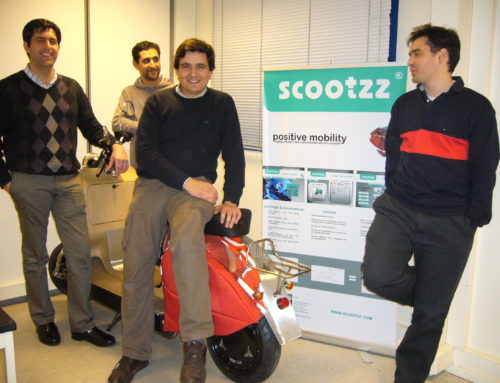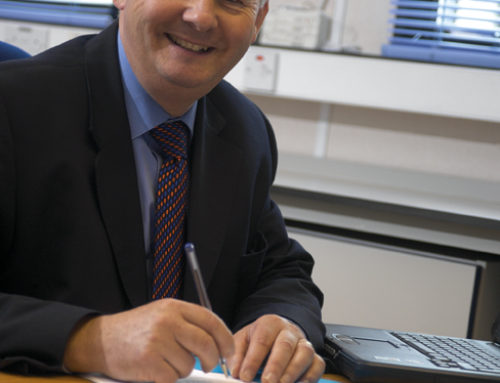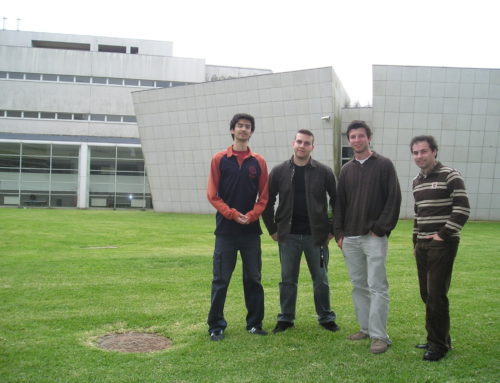With the support of Bank Santander, the University of Porto was given the chance to send one of his collaborators to the Babson Symposium for Entrepreneurship Educators for Santander Fellows. In this context, MIETE Director was able to be in touch not only with Entrepreneurship Educators from around the world, but also with Babson Entrepreneurship training team. In this interview we start by talking with Sebastião Beltrão, the Director of Santander Universities Global Division. We then interview our two guests from Babson College. Heidi Neck is the Jeffry A. Timmons Professor of Entrepreneurial Studies at Babson College. As Faculty Director of the Babson Symposium for Entrepreneurship Educators (SEE) that has been running for several years and influencing Entrepreneurship Educators around the world. Walter Esquivel is the Director of The William F. Glavin Center for Global Management which is the organization that leads Babson College’s international initiatives and contribution to the advancement of global management education.MIETE-BLOG: Babson College is Ranked #1 among all business schools for entrepreneurship. What is the motivation of Bank Santander to support such innitiatives and bring to Babson people from around the world? Is there a special focus on entrepreneurship?
 Sebastião Beltrão: More than a focus on entrepreneurship, our motivation is to contribute to the development of universities. We believe that one of the main critical issues for universities is entrepreneurship, by which I mean, not only the creation of new companies, but also the exchange of knowledge between Universities and companies.Why Babson College? As you mentioned, it is one of the best in entrepreneurship and this is one important reason, but another important reason is the fact that the USA is a new market for us. Santander recently bought Sovereign Bank and we are starting a Santander Universities program in the USA. Babson was one of our first agreements in this country. This Symposium is a way to give added value to the agreement with this important school.Santander Universities Global Division is an international program of social responsibility to contribute to the Higher Education System in each of the countries where Santander has business. We have agreements with around 700 Universities in 14 countries in America, Europe and Asia. With these agreements we support more than 2.500 projects including Entrepreneurship, international mobility, grant programs, research and development projects, to name a few.
Sebastião Beltrão: More than a focus on entrepreneurship, our motivation is to contribute to the development of universities. We believe that one of the main critical issues for universities is entrepreneurship, by which I mean, not only the creation of new companies, but also the exchange of knowledge between Universities and companies.Why Babson College? As you mentioned, it is one of the best in entrepreneurship and this is one important reason, but another important reason is the fact that the USA is a new market for us. Santander recently bought Sovereign Bank and we are starting a Santander Universities program in the USA. Babson was one of our first agreements in this country. This Symposium is a way to give added value to the agreement with this important school.Santander Universities Global Division is an international program of social responsibility to contribute to the Higher Education System in each of the countries where Santander has business. We have agreements with around 700 Universities in 14 countries in America, Europe and Asia. With these agreements we support more than 2.500 projects including Entrepreneurship, international mobility, grant programs, research and development projects, to name a few.
More than financial support, with Santander Universities, we are able to offer a network of contacts and agreements that give added value to the Universities. The Babson Symposium is a good example of this. Other examples are the Luso-Brasilian grant program, www.Universia.com (the biggest internet portal of universities in the world), The Miguel de Cervantes virtual library, among many others.
We believe that the best way to contribute to society is through the University, for this reason the majority of Santander’s Social Responsibility funds are centered in Santander Universities Global Division.
MIETE-BLOG: Heidi and Walter, thank you so much for your time and for accepting our invitation to this interview. We are most flattered by your collaboration. Heidi, you have been managing this program, combining both valuable content and the demonstration of different lecturing styles and tools. The combination produces a definitely awesome program that kept all students involved along many hours of training. You shared with us that you hear time and time again that the program has positively affected their lives in some way. Would you share some of your thoughts? Moreover, as teaching entrepreneurship is a method not a recipe, can you give educators an hint on how to achieve best results out of what they got on the SEE?
 Heidi Neck: Entrepreneurship is often thought of as a process – a process of identifying an opportunity, understanding resource requirements, acquiring resources, planning, and implementing. But the word “process” assumes known inputs and known outputs as in a manufacturing process. For example, building a car on an assembly line is a manufacturing process. You know all the parts; you know how they fit together; and you know the type of car you will have at the end. A process is quite predictable. Entrepreneurship is not predictable. This is why I say that entrepreneurship is more of a method than a process. A method represents a body of skills or techniques; therefore, teaching entrepreneurship as a method simply implies that we are helping students understand, develop, and practice the skills and techniques need for productive entrepreneurship. Teaching entrepreneurship as a method requires going beyond understanding, knowing, and talking; it requires using, applying, and acting. Entrepreneurship requires practice.
Heidi Neck: Entrepreneurship is often thought of as a process – a process of identifying an opportunity, understanding resource requirements, acquiring resources, planning, and implementing. But the word “process” assumes known inputs and known outputs as in a manufacturing process. For example, building a car on an assembly line is a manufacturing process. You know all the parts; you know how they fit together; and you know the type of car you will have at the end. A process is quite predictable. Entrepreneurship is not predictable. This is why I say that entrepreneurship is more of a method than a process. A method represents a body of skills or techniques; therefore, teaching entrepreneurship as a method simply implies that we are helping students understand, develop, and practice the skills and techniques need for productive entrepreneurship. Teaching entrepreneurship as a method requires going beyond understanding, knowing, and talking; it requires using, applying, and acting. Entrepreneurship requires practice.
This is what we address in our SEE program. Participants have a dual role. We simulate a classroom environment where participants assume the role of students so they can experience the various pedagogies we are using to teach entrepreneurship as a method. The other role participants’ play is that of a reflective educator. The SEE program does not exist to dictate a particular way of teaching entrepreneurship. On the contrary, the SEE program creates a platform for all of us to start thinking about the next levels of entrepreneurship education. The SEE program is a combination of what Babson does best plus what we (Babson and participants) can create together for the future of entrepreneurship education.
It’s hard to address in analytical terms the impact of SEE programs on faculty around the world, but we have heard time and time again that we have built a global network of like-minded educators who see the extraordinary value and power of entrepreneurship. This international exchange is unique. Even in the last Babson SEE Santander program we had 10 countries represented in a group of 30 – that’s a very eclectic group that creates a wonderful and exciting foundation for co-creation. The exchange in the classroom was spirited and ideas were flowing. The electricity in our SEE programs can only be experienced because it’s difficult to put into words what happens when passion, expertise, and creativity collide for the purpose of enhancing entrepreneurship education.
MIETE-BLOG: The Symposium for Entrepreneurship Educators has also been presented in several countries around the world as well as other training modules you have to cover several topics related with management and entrepreneurship. There are for sure many success stories where new entrepreneurship programs and centers were launched with the support of Glavin Global Programs at Babson College. Can you tell us about one of those examples?
 Walter Esquivel: For Babson College, entrepreneurship is a way of thinking and acting. We take this philosophy to many countries where faculty members are trained in train-the-trainer programs. One of the programs is offered via six modules with deliveries every three months, where Babson covers all dimensions of entrepreneurship as well as case writing and teaching; and yet another program consists in an eighteen month process where a team of two participants per university writes a case with the support of Babson College faculty and ends up the creation of a Collection of Cases.
Walter Esquivel: For Babson College, entrepreneurship is a way of thinking and acting. We take this philosophy to many countries where faculty members are trained in train-the-trainer programs. One of the programs is offered via six modules with deliveries every three months, where Babson covers all dimensions of entrepreneurship as well as case writing and teaching; and yet another program consists in an eighteen month process where a team of two participants per university writes a case with the support of Babson College faculty and ends up the creation of a Collection of Cases.
MIETE-BLOG: We have been running our Master Program in Innovation and Technological Entrepreneurship (MIETE) since 2004, and the current model (2nd Cycle – European model for a Master Level program) since September 2007. So far five companies have been launched with the business plan developed within MIETE courses. From your point of view, and since we don’t tackle intra-enterprise innovation, what is the value, for existing businesses, to have their collaborators enrolled in an entrepreneurship master program such as ours? (we have a 10mins English video presentation of our program at our home page http://www.fe.up.pt/miete)
Walter Esquivel: I would surely encourage collaborators of enterprises to sign up and take entrepreneurship courses within Master’s, MBA’s or Executive Education. In this regard, it is important to highlight that entrepreneurship is not limited to start-ups. The Entrepreneurial Thought and Action is a process, an attitude that is vital not only for the creation of business, but most certainly for corporations, family businesses and for non-profits as well. Corporate Entrepreneurship (which you call intra-enterprise) is essentially using the entrepreneurship mindset and process to create products and services that turn the enterprise into a high impact company.
On behalf of MIETE and of our BLOG, I would like to thank Heidi Neck, Sebastião Beltrão and Walter Esquivel for their most valuable participation in this interview. Thank you so much for your time!
João José Pinto Ferreira
(MIETE Director)




